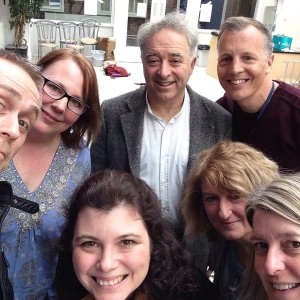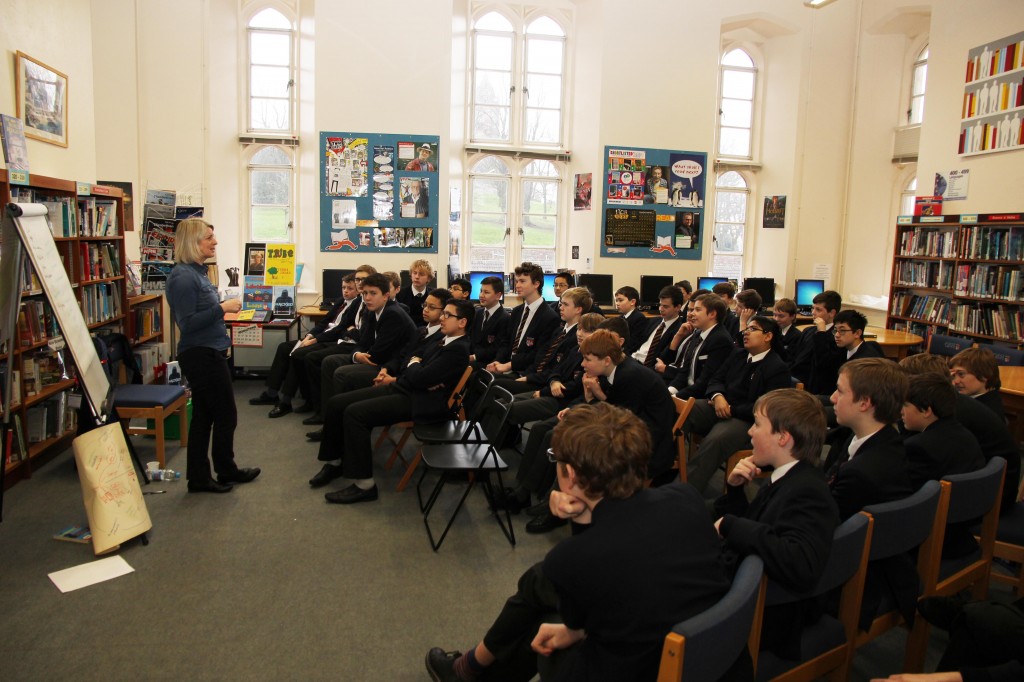On Friday I ran a workshop at the Cabot Federation Conference attended by 1200 teachers. Luckily only 40 of them came to my session, because that made it unruly enough. It was a bit of a risk to make adults join in with the storymaking I do with Year 5 but I went at it with gusto and, with the help of a few joiner-inners, we ended up having proper belly laughs. The story was no great shakes, basically Solid Dave and Saphire (yes, teachers can’t spell) got lost in a book (physically not metaphorically) and had to battle Hamlet in a graveyard, dive down the plughole and escape certain cannibalism via fire. Everyday stuff. Judging by the kind comments afterwards, teachers quite like being treated like ten-year olds. It made a nice change to both talk to adults, and to use my dustbin full of props again. The events I do to promote my YA novels in secondary schools still have plenty of interaction and flip-chart mayhem, but pulling skulls and rubber ducks out of a bin doesn’t have a place. Shame. Maybe I’ll reintroduce it . . .
 The day before my audience consisted of two groups of Year 8 girls from Nottingham Girls’ School, and a lovely bunch they were too. (And less unruly.) The first session was unexpectedly small as, for some unfathomable reason, a smattering had gone to Latin, forgetting I was there. The downside was that we started late. The upside was that we got to have a chat, which is always nice because teenagers can be loathe to put their hands up and join in, but once they’d realised I was quite funny (in an unhinged but not threatening way) (and I’d been complimented on my new culotte dress) we were cruising. Every single time I visit a school I learn something – this time I had a drone expert in the audience. I offered her a job as my sidekick but she didn’t seem that keen.
The day before my audience consisted of two groups of Year 8 girls from Nottingham Girls’ School, and a lovely bunch they were too. (And less unruly.) The first session was unexpectedly small as, for some unfathomable reason, a smattering had gone to Latin, forgetting I was there. The downside was that we started late. The upside was that we got to have a chat, which is always nice because teenagers can be loathe to put their hands up and join in, but once they’d realised I was quite funny (in an unhinged but not threatening way) (and I’d been complimented on my new culotte dress) we were cruising. Every single time I visit a school I learn something – this time I had a drone expert in the audience. I offered her a job as my sidekick but she didn’t seem that keen.

When I got back to Bristol, good news was waiting for me from the Wirral. Back in March eight authors had travelled far and wide to attend a daylong event with teenagers from eight schools. Each shortlisted author gave a talk followed by a Q&A. The pupils then had a few months to read the books before voting, and absolutely fabulously they chose Hacked. Thrilled.
All in all, a good week. Topped off by Andy Murray.


 ReviewAs someone who has spent the vast majority of my life near a keyboard, mouse and monitor it’s probably no surprise that this book appealed to me. And appeal to me it did.
ReviewAs someone who has spent the vast majority of my life near a keyboard, mouse and monitor it’s probably no surprise that this book appealed to me. And appeal to me it did. 


 of the first five school visits in 2015 were: the QEH boys who knew everything and more about DDoSs, Lizard Squad and botnets, including the one who had actually built his own drone and the scary moment where I had to debate the difference between cyber-crime and hacking; the terribly nice English teacher at Clifton High who suggested I carry on all afternoon as it was so interesting; the great discussion we had at Clifton College about character development, and the bit about how you make a first-person narrator die; Hassan and Brittany doing a brilliant job collecting all the suggestions on the flipchart at Bristol Brunel; and the after-school writing club at Cathedral where we shared writing tips.
of the first five school visits in 2015 were: the QEH boys who knew everything and more about DDoSs, Lizard Squad and botnets, including the one who had actually built his own drone and the scary moment where I had to debate the difference between cyber-crime and hacking; the terribly nice English teacher at Clifton High who suggested I carry on all afternoon as it was so interesting; the great discussion we had at Clifton College about character development, and the bit about how you make a first-person narrator die; Hassan and Brittany doing a brilliant job collecting all the suggestions on the flipchart at Bristol Brunel; and the after-school writing club at Cathedral where we shared writing tips.
